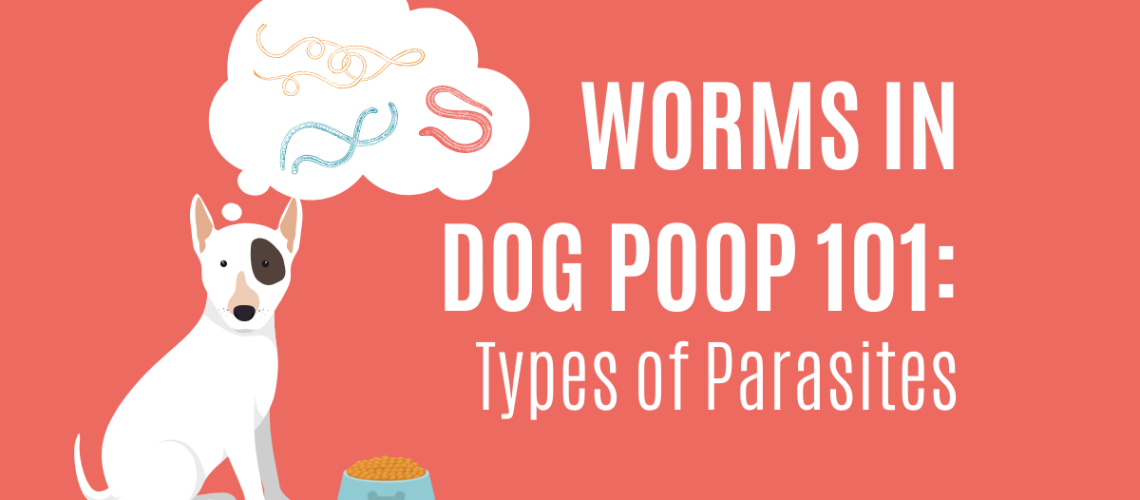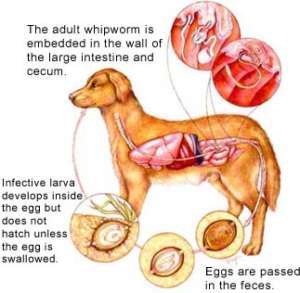Key Takeaways:
- Presence of worms in your dog's poop indicates a parasitic infection that needs to be treated immediately.
- Common types of worms found in dogs' poop include roundworms, tapeworms, hookworms, and whipworms.
- Symptoms of worm infestation may include weight loss, vomiting, diarrhea, bloating, and a dull coat.
- Regular deworming and preventive measures like keeping the environment clean and avoiding contact with infected animals can help prevent worm infestations.
- If you find worms in your dog's poop, it is important to consult a veterinarian for proper diagnosis and treatment.
Have you ever wondered what it means if you find worms in your dog's poop? Well, buckle up because this topic is about to reveal some eye-opening information that every dog owner needs to know. Understanding the significance of these creepy crawlies lurking in your furry friend's waste can have a tremendous impact on their health and well-being. Not only will we explore the reasons behind this unsettling discovery, but we'll also uncover the steps you can take to keep your pup safe and healthy. So, get ready to dive into the fascinating world of doggie digestive health and discover how to protect your beloved pet from potential harm. Get ready to become a poop detective!
What does it mean if you find worms in your dog's poop?
Finding worms in your dog's poop can be a sign that your furry friend has a parasitic infection. These worms are usually acquired through ingesting contaminated food, water, or soil. Common types of worms found in dogs include roundworms, tapeworms, hookworms, and whipworms.
Types of worms found in a dog's feces:
- Roundworms: These long, spaghetti-like worms are the most common type found in dogs. They can be easily seen in the poop or vomit and can cause symptoms like diarrhea, vomiting, weight loss, and a potbellied appearance.
- Tapeworms: Tapeworms are flat and segmented parasites that resemble grains of rice. They may appear in the feces or around the dog's anus. Dogs can get tapeworms by ingesting fleas or small animals infected with tapeworm larvae.
- Hookworms: Hookworms are tiny worms that attach to the lining of the dog's intestines and feed on their blood. They can cause anemia, weight loss, diarrhea, and weakness. Hookworm larvae can also penetrate the skin and cause skin infections.
- Whipworms: Whipworms are thin worms with one end thicker than the other. They live in the large intestine and can cause chronic diarrhea with blood or mucus. Infected dogs may also experience weight loss and anemia.
Why is it important to notice worms in your dog's poop?
Noticing worms in your dog's poop is crucial because it indicates that they have an infestation that needs to be treated. If left untreated, the worms can cause various health problems and discomfort for your dog. Additionally, some worms can be transmitted to humans, posing a risk to human health.
How can finding worms in your dog's poop affect their health?
Finding worms in your dog's poop is a sign that they have a parasitic infection, which can have several negative effects on their health. The presence of worms in the intestines can lead to poor nutrient absorption, causing weight loss and malnutrition. Some worms also feed on blood, leading to anemia and weakness in dogs. In severe cases, heavy infestations can block the intestines or migrate to other organs, causing more serious complications.
Why is it important to notice worms in your dog's poop?
Noticing worms in your dog's poop is crucial because it can indicate a potential health issue that needs attention. Worms are parasites that live inside your dog's body and feed off their nutrients, causing harm to their overall well-being. By observing the presence of worms in their feces, you can take immediate action to protect your furry friend from further complications.
When left untreated, worms can lead to various health problems for your dog. They can cause weight loss, weakness, diarrhea, vomiting, and even anemia. Additionally, some types of worms can be transmitted to humans, posing a risk to the entire family. Therefore, being vigilant about noticing worms in your dog's poop is essential for both their health and the well-being of everyone around them.
How can finding worms in your dog's poop affect their health?
Finding worms in your dog's poop is a clear indication that they have been infected with these pesky parasites. These worms can cause significant harm to your furry companion if not promptly addressed. When present in large numbers or left untreated for an extended period, they can lead to severe health issues.
The presence of worms in a dog's intestines interferes with their digestion and nutrient absorption process. This can result in malnutrition and weight loss over time. Moreover, certain types of worms can migrate through other organs like the heart and lungs, causing additional complications.
If you notice worms in your dog's poop or suspect an infestation based on other symptoms (which we will discuss later), it is crucial to consult a veterinarian as soon as possible. They will be able to diagnose the specific type of worm and recommend appropriate treatment options tailored to your dog's needs.
Common types of worms found in a dog's feces
There are several types of worms that can be found in a dog's feces. These include:
1. Roundworms (Toxocara Canis)
Roundworms are the most common type of worm found in dogs. They resemble spaghetti and can grow up to several inches long. Puppies are particularly susceptible to roundworm infections, as they can be transmitted from their mother during birth or through her milk.
2. Hookworms (Ancylostoma Caninum)
Hookworms are small, thin worms that attach themselves to the intestinal lining of dogs and feed on their blood. They can cause anemia, weight loss, and diarrhea.
3. Tapeworms (Dipylidium Caninum)
Tapeworms are flat, segmented worms that can reach lengths of up to several feet. They resemble small grains of rice and often appear in your dog's poop or around their anus.
4. Whipworms (Trichuris Vulpis)
Whipworms are thin worms with a whip-like shape that reside in the large intestine of dogs. They can cause chronic diarrhea, weight loss, and anemia if left untreated.
Signs and symptoms of worms in dogs besides seeing them in their poop
In addition to observing worms in your dog's poop, there are other signs and symptoms that may indicate a worm infestation:
- Vomiting
- Coughing
- Lethargy
- Bloated abdomen
- Increased appetite
- Poor coat condition
- Visible worms or eggs around the anus
If your dog exhibits any of these symptoms, it is essential to seek veterinary care for a proper diagnosis and treatment plan.
Steps to take if you discover worms in your dog's poop
If you discover worms in your dog's poop, follow these steps:
- Contact your veterinarian: Inform them about the presence of worms and describe any other symptoms you have noticed.
- Collect a stool sample: Your vet may ask you to bring a fresh stool sample for examination. This will help determine the specific type of worm and guide the appropriate treatment.
- Follow the recommended treatment: Based on the diagnosis, your veterinarian will prescribe medication to eliminate the worms. It is crucial to administer the medication as directed and complete the full course of treatment.
- Maintain good hygiene: Clean up after your dog promptly and dispose of their waste properly to prevent reinfestation or transmission to other pets or humans.
- Schedule follow-up appointments: Regular check-ups with your veterinarian will ensure that the worm infestation has been successfully treated and monitor your dog's overall health.
Remember, early detection and prompt treatment are key to ensuring your dog's well-being. By staying vigilant and taking necessary precautions, you can help keep your furry friend happy, healthy, and worm-free!
In conclusion, finding worms in your dog's poop may indicate that your dog has intestinal parasites. It is important to take your dog to the vet for proper diagnosis and treatment to ensure their health and well-being.
What to do if my dog has worms in his poop?
Dogs often acquire worms by consuming contaminated feces or raw meat. However, puppies are more susceptible to getting worms from their surroundings because their immune systems are not yet fully developed. Typically, intestinal parasites can be effectively treated with deworming medication prescribed by a veterinarian.
Why did I find worms in my dogs poop?
If dogs accidentally eat fleas that have tapeworm larvae, they can become infected with tapeworms. Tapeworms rely entirely on their host for nutrition and are unable to survive independently. Dogs that are smaller, younger, or have a weakened immune system may be more susceptible to developing worms in their feces compared to others.
Is it normal for dogs to have worms in their poop?
Typically, it indicates the presence of intestinal parasites. Dogs acquire parasites by coming into contact with eggs in the soil or feces of an infected dog. They unintentionally consume the minuscule eggs of the parasites while grooming or by ingesting contaminated soil or feces.
How common are worms in dog poop?
Intestinal worms that live off their host's body are quite common in dogs. The prevalence of hookworm, roundworm, tapeworm, and whipworm infections in dogs can be as high as 3.24%, 1.95%, up to 60%, and 0.57%, respectively. It is crucial to understand that many of these parasites can also infect humans, making them zoonotic.
Are dog worms contagious to humans?
Dogs and cats can become infected by ingesting dirt or feces containing worm eggs or larvae. Can roundworms and hookworms affect humans? Yes, these worms, like other infections that can be transmitted from animals to humans, are known as zoonotic infections or zoonoses.
What kills stomach worms in dogs?
Medications such as ivermectin, pyrantel pamoate, and fenbendazole are commonly used to eliminate stomach worms in cats and dogs. In addition, anti-nausea medications and gastroprotectants can be given to reduce vomiting and protect the gastrointestinal system. With the right treatment, the outlook for your pet is highly favorable.

















